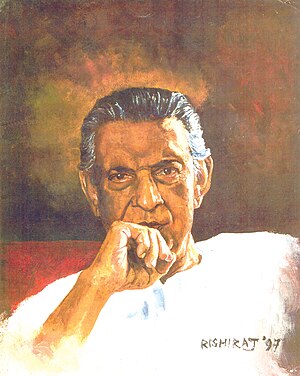
The Apu Trilogy comprises three Indian Bengali-language drama films directed by Satyajit Ray: Pather Panchali (1955), Aparajito (1956) and The World of Apu (1959). The original music for the films was composed by Ravi Shankar.

Pather Panchali is a 1955 Indian Bengali-language drama film written and directed by Satyajit Ray in his directoral debut and produced by the Government of West Bengal. It is an adaptation of Bibhutibhushan Bandyopadhyay's 1929 Bengali novel of the same name and features Subir Banerjee, Kanu Banerjee, Karuna Banerjee, Uma Dasgupta, Pinaki Sengupta and Chunibala Devi in major roles. The first film in The Apu Trilogy, Pather Panchali depicts the childhood travails of the protagonist Apu and his elder sister Durga amidst the harsh village life of their poor family.
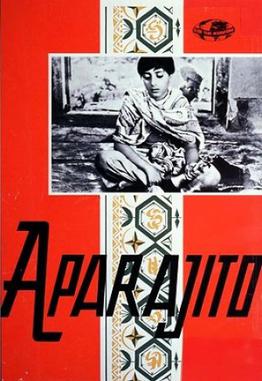
Aparajito is a 1956 Indian Bengali-language drama film written and directed by Satyajit Ray, and is the second part of The Apu Trilogy. It is adapted from the first half of Bibhutibhushan Bannerjee's novel Aparajito. It starts off where the previous film Pather Panchali (1955) ended, with Apu's family moving to Varanasi, and chronicles Apu's life from childhood to adolescence in college.
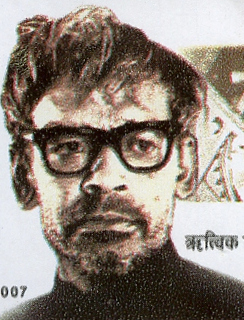
Ritwik Kumar Ghatak was an Indian film director, screenwriter, actor and playwright. Along with prominent contemporary Bengali filmmakers like Satyajit Ray, Tapan Sinha and Mrinal Sen, his cinema is primarily remembered for its meticulous depiction of social reality, partition and feminism. He won the National Film Award's Rajat Kamal Award for Best Story in 1974 for his Jukti Takko Aar Gappo and Best Director's Award from Bangladesh Cine Journalist's Association for Titash Ekti Nadir Naam. The Government of India honoured him with the Padma Shri for Arts in 1970.

Apur Sansar, also known as The World of Apu, is a 1959 Indian Bengali-language drama film produced, written and directed by Satyajit Ray. It is based on the second half of Bibhutibhushan Bandopadhyay's novel Aparajito. Following Pather Panchali (1955) and Aparajito (1956), The World of Apu is the final part of Ray's The Apu Trilogy, about the childhood and early adulthood of a young Bengali named Apu in early twentieth century India. The World of Apu stars Soumitra Chatterjee and Sharmila Tagore ; the duo would go on to appear in many subsequent Ray films.

SoumitraChatterjee was an Indian film actor, play-director, playwright, writer, thespian and poet. He is regarded as one of the greatest and most influential actors in the history of Indian cinema. He is best known for his collaborations with director Satyajit Ray, with whom he worked in fourteen films.

Ghare Baire is a 1984 Indian Bengali-language romantic drama film directed and written by Satyajit Ray. Based on Rabindranath Tagore's novel of the same name, starring Soumitra Chatterjee, Victor Banerjee, Jennifer Kendal and Swatilekha Chatterjee. The film has a complex portrayal of several themes including nationalism, women emancipation, spiritual and materialistic take on life, tradition versus modernism, and others.

Goopy Gyne Bagha Byne is a 1969 Indian fantasy adventure comedy film written and directed by Satyajit Ray and based on a story by his grandfather Upendrakishore Ray Chowdhury. It is a fantasy musical, with music and lyrics composed and written by Ray himself. This is the first film of the Goopy–Bagha series, and there are two sequels – Hirak Rajar Deshe, which was released in 1980, and Goopy Bagha Phire Elo, written by Satyajit Ray but directed by his son Sandip Ray, which was released in 1992.
The National Film Award for Best Feature Film is one of the categories in the National Film Awards presented annually by the Directorate of Film Festivals, the organisation set up by Ministry of Information and Broadcasting in India. It is one of several awards presented for feature films and awarded with the Golden Lotus. The award is announced for films produced in a year across the country, in all Indian languages. As of 2017, the award comprises a Swarna Kamal, a certificate, and a cash prize of ₹ 2,50,000 and is presented to the producer and the director of the film.
The National Film Award for Best Direction is an honour presented annually at India's National Film Awards ceremony by the Directorate of Film Festivals (DFF), an organisation set up by the Indian Ministry of Information and Broadcasting. Since 1967, the award is given by a national panel appointed annually by the DFF to a director for their work within Indian cinema. It is presented by the president of India at a ceremony held in New Delhi.

The National Film Award for Best Music Direction is an honour presented annually at the National Film Awards by the Directorate of Film Festivals to a musician who has composed the best score for films produced within the Indian film industry. The award was first introduced at the 15th National Film Awards in 1967. At the 42nd National Film Awards, an award for "Best Background Score" was instituted. It was however discontinued after that, and it was not until 2009 that the category was re-introduced. A total of 51 awards—including award for Best Background score—to 40 different composers.
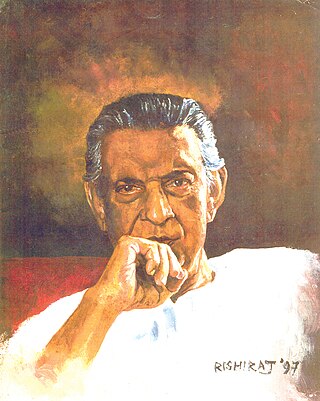
Satyajit Ray was an Indian filmmaker who worked prominently in Bengali cinema and who has often been regarded as one of the greatest and most influential directors in the History of cinema. Ray was born in Calcutta to a Bengali family and started his career as a junior visualiser. His meeting with French film director Jean Renoir, who had come to Calcutta in 1949 to shoot his film The River (1951), and his 1950 visit to London, where he saw Vittorio De Sica's Ladri di biciclette (1948), inspired Ray to become a film-maker. Ray made his directorial debut in 1955 with Pather Panchali and directed 36 films, comprising 29 feature films, five documentaries, and two short films.
Subrata Mitra was an Indian cinematographer. Acclaimed for his work in The Apu Trilogy (1955–1959), Mitra often is considered one of the greatest Indian cinematographers.
Parallel cinema or New Indian Cinema, is a film movement in Indian cinema that originated in the state of West Bengal in the 1950s as an alternative to the mainstream commercial Indian cinema.

Subir Banerjee is an Indian actor who played Apu in Satyajit Ray's Bengali film Pather Panchali, the first installment of The Apu Trilogy.

Satyajit Ray was an Indian director, screenwriter, documentary filmmaker, author, essayist, lyricist, magazine editor, illustrator, calligrapher, and composer. Ray is widely considered one of the greatest and most influential film directors in the history of cinema. He is celebrated for works including The Apu Trilogy (1955–1959), The Music Room (1958), The Big City (1963), Charulata (1964), and the Goopy–Bagha trilogy (1969–1992).[a]

Cinema of West Bengal, also known as Tollywood or Bengali cinema, is an Indian film industry of Bengali-language motion pictures. It is based in the Tollygunge region of Kolkata, West Bengal, India. The origins of the nickname Tollywood, a portmanteau of the words Tollygunge and Hollywood, dates back to 1932. It was a historically important film industry, at one time the centre of Indian film production. The Bengali film industry is known for producing many of Indian cinema's most critically acclaimed global Parallel Cinema and art films, with several of its filmmakers gaining prominence at the Indian National Film Awards as well as international acclaim.
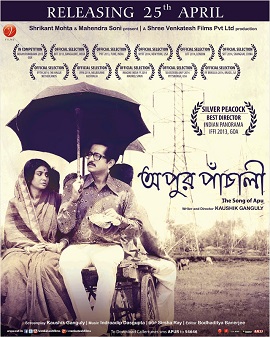
Apur Panchali is a 2013 Bengali film directed by Kaushik Ganguly and produced by Shree Venkatesh Films. It is based on the life of Subir Banerjee, the actor who played Apu in Pather Panchali (1955), the first film of Satyajit Ray's Apu trilogy. Director Kaushik Ganguly won the award of best director for Apur Panchali in the 44th International Film Festival of India (IFFI) in November 2013. The director mentioned in an interview that he found similarities between certain parts of the life of Subir Banerjee and the iconic character Apu. The film uses several minutes of footage from Pather Panchali in its narrative.

Shoma A. Chatterji is an Indian film scholar, author and freelance journalist. She has been the recipient of a number of awards including the National Film Award for Best Film Critic in 1991 and the National Awards for Best Writing on Cinema for her study of the works of Aparna Sen in the publication, Parama and Other Outsiders: The Cinema of Aparna Sen (2002). Notably, she is the only woman to have won both the national awards. She is the author of several biographies including those on Pramathesh Barua, Ritwik Ghatak and Suchitra Sen.
